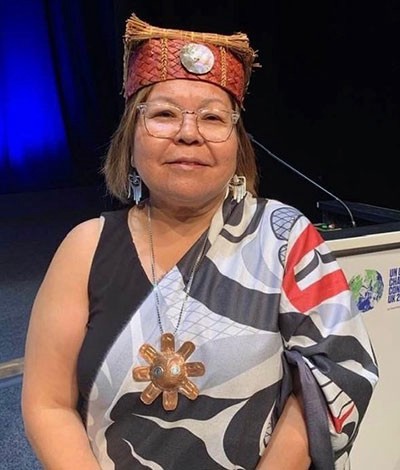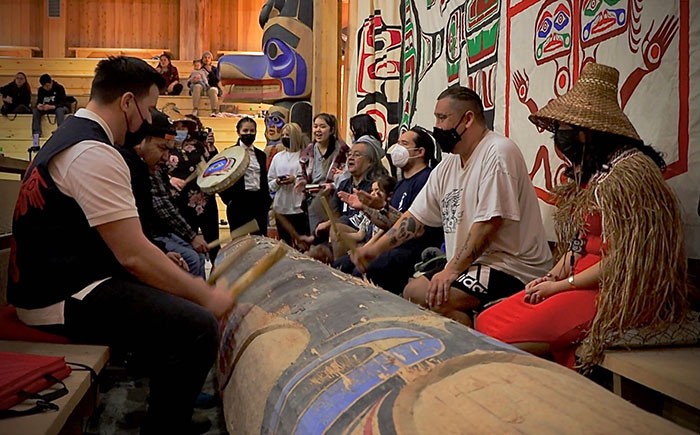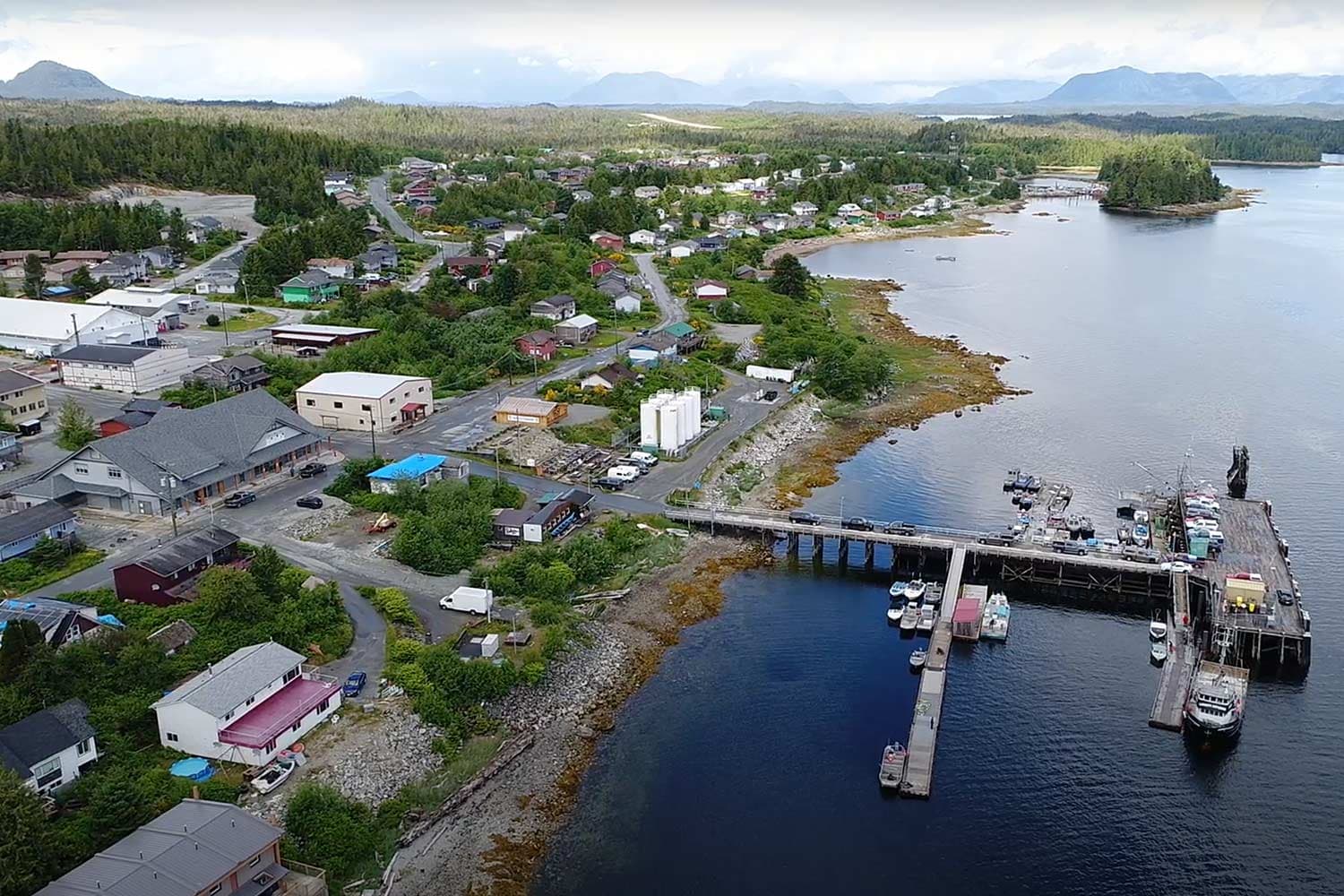Clean Energy, Haíłzaqv-Style
This BC First Nation is using green technology to live out its ancestral values.
The community of Bella Bella is located on an island off the central coast of BC, territory that the Haíłzaqv Nation has occupied for over 14,000 years.
The Haíłzaqv (Heiltsuk) community of Bella Bella is located on a remote island off the central coast of BC, in the heart of the Great Bear Rainforest. We have continuously occupied and stewarded this territory for over 14,000 years. Our 2,400-member nation relies on marine fishing for our livelihood; our sustainable herring-roe-on-kelp fishery is protected by a Supreme Court of Canada ruling. Within this community, I play many roles: daughter, mother, grandmother, fisherwoman, elected tribal councillor, chair of the economic development corporation, and climate action coordinator.
October 13, 2016, is a day etched in my memory. The tugboat Nathan E. Stewart ran aground in our territory, spilling over 110,000 litres of diesel. The waters where the fuel spilled were home to over 20 species critical to our sustenance and food sovereignty. This traumatic event energized our community to protect our environment.
To be Haíłzaqv is to act and speak correctly as a human being. The elders tell us to “Ḣíkilaxsi qṇts n̓ála’áx̌v,” which means, “Protect our world.” The Haíłzaqv do not divide our natural world into pieces — everything is one. We are no more separate than the fish from the ocean, we need each other.

The author spoke about the Haíłzaqv Nation’s Community Energy Plan at the UN climate change conference (COP26) in Glasgow, Scotland, in 2021.
The closest word we have to “environment” is the all-encompassing “wáxv’w̓uísá.” Since we are a part of the wáxv’w̓uísá, we are responsible to it. We know that what we do affects the land, water, and sky. Our ultimate responsibility is to them and other living things. This teaching is what gives our climate action its power.
Our intention for this important work is ensuring that it be done “by the Haíłzaqv, for the Haíłzaqv.” We are proud of the Haíłzaqv-driven work done by our Climate Action Team.
Our plan will create healthier homes, affordable energy, greater food security, clean jobs, economic opportunities, and a sustainable future for our people.
Our way of life is deeply impacted by the changes in our wáxv’w̓uísá caused by climate change. We started developing a Community Energy Plan because we were dependent on fossil fuels like oil and diesel to heat homes and community buildings, and provide back-up electricity generation. This plan will help us transition to “łáxváika’aus qṇts wáxv’w̓uísáx̌” (our words for “clean energy,” which translate to “the power that comes from our territories”), including solar, hydro, tidal, wind, and geothermal.
This transition will protect our homelands and waterways for future generations. Our plan will create healthier homes, affordable energy, greater food security, clean jobs, economic opportunities, and a sustainable future for our people.

The Haíłzaqv Climate Action Team’s heat pump project has so far retrofitted 154 homes in Bella Bella, and 120 more pumps are scheduled for installation during summer 2022. The project is also funding training for community members to install and maintain the appliances in the future.
The complete plan contains climate solutions with different degrees of complexity and cost, including:
- conducting home energy audits of all Bella Bella homes
- providing all homes with “Eco Kits” containing LED lightbulbs and other easy-to-install improvements
- retrofitting 75% of community buildings (like the school) to make them more energy-efficient
- switching all home heating to efficient electric heat pumps
- replacing wood-burning stoves with more efficient catalytic wood stoves
- electrifying 75% of community transport vehicles and at least 50% of our marine vessels
- replacing all diesel used in boats and vehicles with bio-diesel
- replacing our back-up diesel generator with a renewable alternative
- investing in local food infrastructure like vertical farming and land-based aquaponics
- developing a kit families can use to build their own passive house
- and investigating opportunities for alternative energy generation on our territories.
We are proud to share this plan as an example of local government finding local solutions to the climate crisis. Because we deeply value reciprocity, we make a standing offer to support any other First Nation in advancing their own climate solutions, by sharing our experiences, lessons learned, and challenges.

The Haíłzaqv Nation hosted other First Nations, energy experts, and representatives of NGOs, federal, and provincial governments in the Gvúkva’áus Haíłzaqv (House of the Heiltsuk), to celebrate the creation of the Community Energy Plan with song, dance, and drumming.
Our flagship climate action has been a residential heat pump project. To date, we have retrofitted 154 of our 429 homes with electric heat pumps, replacing less efficient electrical and oil-based heating systems. Our community members are already experiencing the benefits of shifting toward a clean energy future, including lower energy bills and better air quality. The average annual benefits per household will be:
- a 40% savings on energy costs (about C$1,500);
- 1,800 L of diesel displaced;
- and greenhouse gas emissions reduced by 5 metric tonnes.
Over the next 15 years, our community will save C$5.5 million on energy bills, reduce our use of oil by over 25,000 barrels, and eliminate 11,000 metric tonnes of greenhouse gas emissions.
We know that what we do affects the land, water, and sky. Our ultimate responsibility is to them and other living things.
For 2022/23, we’ve already raised C$5 million to install 250 more heat pumps. Our other major goal for this time is to build local capacity, training Haíłzaqv members to install and maintain heat pumps, and conduct home energy assessments.
On Saturday, March 12, 2022, the Haíłzaqv people gathered at a community feast in our Big House to celebrate that “lṇts ḣákq̓ṃ’ila wáx̌a” (“we have all agreed”) on the Haíłzaqv Community Energy Plan, created with input from over 1,000 Haíłzaqv members. It was medicinal to come together after the pandemic’s gathering restrictions. Our children performed cultural dancing, as we celebrated this decision our community has made on behalf of them and our children yet to come.
Print Issue: Spring 2022
Print Title: By the Haíłzaqv, for the Haíłzaqv.
